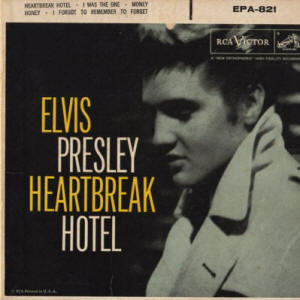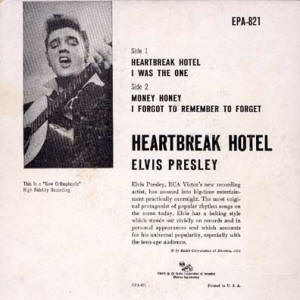Verdict
The record offered four strong tracks, albeit nothing new.
![]()
(C) RCA Victor
The ultimate site about the king of the analogue age


On April 20, 1956 RCA Victor released the extended player "Heartbreak Hotel". Because all other tracks on the record had already been available on singles, Billboard selected "Money Honey" as the key element and listed it on the singles chart "Hot 100". Starting on May 12th the ep had a run of five weeks and worked itself up the charts from number 84 to number 76. After a separate chart for this format had been established, "Heartbreak Hotel" entered the hitparade on April 21, 1958, stayed for three weeks and peaked at number five. The domestic sales were honored with a Gold Award in 1992, worldwide the extended player sold a million copies. Translated to the present that would be 150 million paid streams of the ep.
The extended player is not available on the streaming platforms, because all tracks can be heared on the albums "Elvis Presley" (1956), "Elvis' Golden Records" (1958) and "A Date With Elvis" (1959). In 2016 the complete Presley catalogue was restored and remastered by Vic Anesini for a boxed set of 60 compact discs called "The Album Collection". Sony Music Entertainment provides the streaming platforms with the same versions of the individual albums (in some cases with bonus tracks), albeit in 24 bit/90 khz flac. That means, if the platform of your choice supports high resolution audio, you can enjoy the tracks in the same quality Sony used to scan and master them.
The cover was designed with one of the pictures from Alfred Wertheimer, who had accompanied the young singer in early 1956 for a few days. The backside featured a promo photo, the track listing and liner notes.
To exploit the success of the youngster's first hit single, RCA Victor simply repeated the tracks on the first side of the record. The flipside was filled with the b-side of Elvis' final SUN single and a track from his first longplayer.
Heartbreak Hotel
RCA Victor also released the track on the ep "Heartbreak Hotel" (1956), the albums "Elvis' Golden Records - Volume 1" (1958) and "A Legendary Performer - Volume 1" (1974) as well as on the boxed set "Worldwide 50 Gold Award Hits - Volume 1" (1970). Live performances can be found on the albums "Elvis" (1968) and "Elvis As Recorded At Madison Square Garden" (1972). The song was written by Mae Boren Axton and Tommy Durden. Because Axton wanted to do the young singer a favor, she credited him as a writer and therefore gave him a third of the royalties. In the song the narrator was left by his girl and lives at Heartbreak Hotel, just down the end of Lonely Street. Elvis' vocals mirror the somewhat morbid mood of the tune, the echo also adds a special note. Elvis recorded "Heartbreak Hotel" on January 10, 1956 and chose take number 7 as the master. Producer Steve Sholes wasn't too happy about the track, because up to that point the young singer had been most successful with hyped-up versions of well known country songs. Besides that nobody at RCA Victor seemed to like "Heartbreak Hotel". It's not known weather Sholes trusted the instinct of the Hillbilly Cat or if he thought the first 45 would bomb anyway and he had better control of his artist if he could be made responsible for the flop. Whatever his thoughts might have been, after "Heartbreak Hotel" turned out to be a massive hit discussions of that kind were a thing of the past.
I Was The OneThe ballad in mid-tempo was written by Aaron Schroeder, Claude DeMetrius, Hal Blair and Bill Peppers. Elvis recorded it on January 11, 1956 within ten takes. Because Steve Sholes mixed up the numbering and announced the takes 2, 3 and 7 twice, the master take was labled as "take 7b". The singer was left by his girl and now approaches her new partner. Obviously he once had found the girl completely untouched and taught her how to kiss, to caress and to get the tears flowing if necessary. And now, after his magnum opus is finished, it's gone. Shit happens! RCA Victor released the song on the ep "Heartbreak Hotel" (1956), the album "For LP Fans Only" (1959) and the boxed set "Worldwide 50 Gold Award Hits - Volume 1" (1970).
Money HoneyEven though "Money Honey" was often performed on stage Elvis didn't manage to produce a satisfactory take in the studio (January 10, 1956). So Steve Sholes created a master by splicing the takes 5 and 6. In the song the illiquid narrator asks his girlfriend for money, but is left by her for a more solvent man. His conclusion is to better check the girl's finances before starting a releationship with her. The funny uptempo song was written by Jesse Stone and released in 1953 by The Drifters. Elvis liked their lead singer, Clyde McPhatter, and would later cover some more songs of the group. In August 1956 RCA coupled "Money Honey" with "One-Sided Love Affair" on a single.
I Forgot To Remember To ForgetThe song was written by Stan Kesler and Charlie Feathers, who also recorded it for SUN, but the track remained unreleased at the time. "I Forgot To Remember To Forget" was a part of Elvis' stage repertoire and he had sung it several times on the radio show "The Louisiana Hayride". He finally recorded it on July 21, 1955 and added the drummer Johnny Bernero to his group. The tune was much more conventional than "Mystery Train", so the radio stations preferred "I Forgot To Remember To Forget". RCA Victor re-released the recording on the longplayers "A Date With Elvis" (1959) and "The Sun Sessions" (1976).
The record offered four strong tracks, albeit nothing new.
![]()
(C) RCA Victor